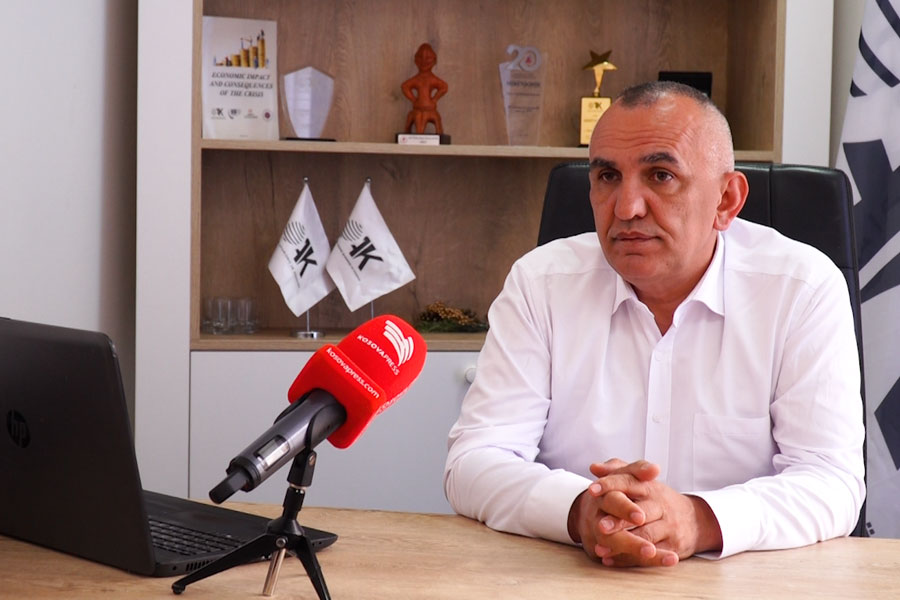The Chamber of Doing Business has welcomed the approval of the draft law by the government to increase the minimum wage to 250 euros, but it requires that this wage be sectoral and not general.
Regarding the economic activity in the country, the President of the Chamber of Doing Business, Skënder Krasniqi considers that there is stagnation and lack of government will to support businesses in with facilities in doing business, and providing supplies and investments.
Whereas, for the support of 800 thousand citizens with 100 euros each, Krasniqi says that these 100 euros, even though they are not enough, the government should have given them in the form of coupons – vouchers for the purchase of local products.
Thus, according to Krasniqi, it would contribute by also giving support to local producers, as well as maintaining and increasing employees.
“By analyzing the actions of different countries, whether in the region or in the European Union, we have requested that this amount of about 100 million euros, not be distributed with salaries or pensions to citizens, but to be done in the form of bonds, since with these bonds, citizens have the opportunity to buy local products. In this way, the citizens would be helped to buy only products and not other things. This would also help businesses, as well as private sector workers or our producers on whom state revenues depend… It is absolutely not enough, even different countries have reacted in different ways all the time, in order to have greater turnover of money for citizens and businesses, and in this way businesses will have the opportunity to keep the workers, but also the citizens can make it, given the increase in high prices that have occurred recently,” he says.
To alleviate the crisis caused by high inflation and rising prices, Krasniqi has asked the government to change the fiscal policies.
“In this regard, we have asked the Government of Kosovo, the Prime Minister Kurti, to reduce VAT on food, from 18 percent to 5 percent, while VAT on essential products from 8 percent to be zero for six months, in order to help businesses, workers and citizens to get through this great crisis as easily as possible, because we are dealing with a very high inflation, compared to previous years. So we have an increase in inflation and an increase in prices for oil, food, and we do not have an increase in wages or an increase in the turnover of most businesses,” he said.
Meanwhile, the Assembly on Thursday, May 5, will review the draft law on the minimum wage. In addition to raising the minimum wage to 250 euros net, Krasniqi says in an interview for KosovaPress, that the salary should be categorized based on professions and education.
“We welcome and we are not against the increase of the minimum wage to 250 euros, but we have thought and think that in this regard the minimum wage should be divided on the basis of different professions and sectors, as it is divided in the West, in way to protect professions. Therefore, the minimum wage should be sectoral, not general. There should be a minimum wage for people without profession, for workers with high school, for those with a university degree, and in this way the categorization is done. But what should be done urgently, since there is an increase in the state budget as a result of rising taxes and rising prices, it should be discussed about health insurance and job insurance. This would be the form of protection of workers and protection of citizens “, says Krasniqi.
Regarding economic growth, Krasniqi says that economic growth over 10 percent in 2021, has not reflected in employment growth and welfare of citizens.
As he adds that the lack of will of the government has made the climate of doing business difficult.
“Any increase is welcome, although economic growth last year has come as a result of a large influx of compatriots and increased consumption, however this increase is not reflecting much on increasing the well-being of citizens and businesses. It is a figure that we have had in previous years, but that has not directly affected the growth of employment and welfare of citizens, because in addition to growth we have a rising inflation… We see stagnation and reluctance of the government and the Ministry of Finance in supporting businesses in doing business, support them regarding the wages, supplies and investments. And the lack of will of the government has made the climate of doing business in Kosovo difficult and will make it even more difficult given that this crisis as it is seen will not be short-term, but long-term,” he said.
Rising prices are also challenging businesses in fulfilling contracts with public institutions.
According to Krasniqi, some businesses have also started filing lawsuits against state institutions, despite repeated requests from the Chamber of Doing Business to review supply contracts.
He stressed that businesses find it impossible to supply goods to the army, police and hospitals.
“We as the Chamber of Doing Business have also asked the Prime Minister and the Government of Kosovo to review the previous agreements between business and state institutions for supply, whether for food, and various materials for municipalities or the government. The main reason is that with the onset of the pandemic, prices have changed and it is impossible for businesses to supply Kosovo institutions, hospitals, the army and police with food and other equipment at current prices. We have asked for the review to be done because all countries have done the review based on the price change. We have asked the government, but we have received no answer in this regard either. Kosovo is simply in danger of having interruptions in the supply of food to hospitals, to the army, to the police due to the inability of businesses to make these supplies at the same prices as a result of major changes. Some businesses have also started suing the state for not making any changes despite the demands.
“We have requested an urgent meeting, but we are waiting and we have not yet received a direct response,” he said.
Among other things, the head of the Chamber has highlighted the lack of communication between the government and businesses, which he says it has stagnated.
For this he urgently asks the government to create an offer and strategy for businesses.
Last week, the government decided to double social assistance for April, an additional 100 euros for all pensioners in April, 100 euros for 300,000 private sector workers, 100 euros for 80,000 public sector workers and 100 euros for 80 thousand students.
So far these funds have not been distributed to private sector workers and students.








